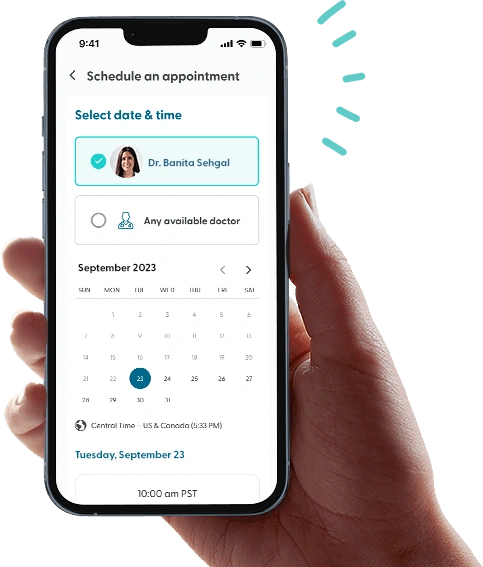Are COVID-19 Night Sweats Common?
Night sweats are uncomfortable episodes of excessive sweating that may disrupt sleep and contribute to other health-related issues.
This is a fairly common condition with around 41% of Americans experiencing some form of night sweats in their lifetime. It more commonly affects women.
Night sweats are usually indicative of an underlying condition or illness. In the last few years, nights sweats have also emerged as a symptom of COVID-19.
In this article, we’ll take a closer look at the causes and treatment options for night sweats.
Concerned about COVID-19?
Book an online appointment with a doctor now to get your symptoms assessed.


What are Night Sweats?
Night sweats are repeated episodes of heavy sweating while you’re asleep. They are usually heavy enough to soak through your clothes and bedding.
Waking up after sweating heavily due to a warm room or sleeping under too many blankets isn’t typically classified as experiencing night sweats.
Night sweats can be accompanied by other symptoms such as:
Fever
Weight loss
Pain in specific areas
Coughing
Diarrhea
These symptoms are classified as the more serious side effects of night sweats. It’s recommended that you make an appointment to see your doctor if you experience any of these.
How to Tell the Difference Between Night Sweats and Regular Sweating
Knowing the difference between night sweats and normal perspiration can be helpful, especially when seeking treatment or wondering if you should be concerned about your symptoms.
Regular sweating can occur due to a number of factors, including:
Exercising before bed
Stress
Eating spicy food
Acid reflux and heartburn
Environmental factors like sleeping under too many blankets or in a room that’s too warm and poorly ventilated
These factors usually aren’t cause for concern and can be treated with lifestyle changes and over-the-counter medication.
Night sweats, however, are caused by underlying medical conditions that range from mild to severe. These can include:
Mental health issues
Viral infections
Low blood sugar
Some of these factors can be life-threatening, so it’s recommended that you speak to a healthcare provider as soon as possible if you’re experiencing night sweats.
What Causes Night Sweats?
Night sweats are usually caused by an underlying medical condition or illness.
It’s always recommended to speak to your healthcare provider if you’re concerned about your symptoms.
The following can be common causes of night sweats:
Menopause
Anxiety or depression
Underlying viral infections like COVID-19
Alcohol or caffeine consumption
Hyperhidrosis — a condition in which the body produces too much sweat for no reason
Low blood sugar (hypoglycemia)
Withdrawal from addictive substances
Sleep disorders like obstructive sleep apnea
Autoimmune disorders like multiple sclerosis, celiac disease, or rheumatoid arthritis
Night sweats can also be caused by these medical conditions:
Cancers like leukemia, lymphoma, or prostate cancer
Hyperthyroidism (or overactive thyroid)
Tuberculosis or HIV
Stroke
Certain medications can also contribute to night sweats, including:
Antidepressants
Hormone replacement therapy treatments
Methadone — a drug used to treat opioid addiction
Hypoglycemic agents used to treat low blood sugar
Are Night Sweats Related to COVID-19?
Night sweats are one of the key symptoms of the Omicron and Delta variants, with over 40% of patients reporting heavy perspiration after infection.
It’s also a common long-term symptom that many patients continue to experience months after the initial infection.
If you don’t have any underlying conditions and are still experiencing night sweats, there is a good chance that they are being caused by a COVID-19 infection. It’s recommended that you get tested to be sure.
While you wait to see if your test shows a positive result, isolate yourself from vulnerable people and wear a mask to keep others safe.
Besides taking any medication prescribed by your doctor, the best treatment for COVID-19 is to rest and drink plenty of liquids.
Medical professionals also agree that staying up to date on your COVID-19 vaccinations may help prevent night sweats.
How to Determine if You Have COVID-19
Although you may know the common symptoms of COVID-19 quite well, it’s always good to remind yourself of what they are. If you experience any of the following symptoms, it may be time to get tested for COVID-19:
Fever or chills
Shortness of breath
Cough
Fatigue
Congested or runny nose
Nausea and vomiting
Loss of taste or smell
Diarrhea
Headache
Symptoms of other COVID-19 variants may also include night sweats or sneezing.
How are Night Sweats Diagnosed?
A licensed healthcare provider can provide a diagnosis and recommend treatment options for night sweats.
They will likely ask you about the following:
How often you’ve been having night sweats and how long they usually last.
If you are taking any new kinds of medications.
If you are experiencing any other symptoms.
They may recommend additional diagnostic procedures like blood tests or getting X-rays done to determine the cause of your night sweats.
What are the Treatment Options for Night Sweats?
The treatment for night sweats will differ depending on the cause. Usually, medications like antidepressants, anti-anxiety drugs, and steroids are used to treat night sweats.
Your doctor may also prescribe antibiotics or antiviral drugs to treat an infection.
If night sweats are caused by menopause, they can be treated with medication that reduces hot flashes. These include:
Paroxetine
Gabapentin
Venlafaxine
In severe cases where night sweats are a symptom of an underlying condition, you may need the following treatments:
Surgery
Hormone replacement therapy that can help reduce menopausal symptoms
Chemotherapy
Radiation
Checking into rehab if night sweats are caused by a drug problem
If night sweats are caused by COVID-19, there’s no set treatment to alleviate it. Your healthcare provider may recommend:
Getting enough rest
Following a balanced diet
Exercising regularly
Implementing ways to manage stress and anxiety
Can night sweats be prevented?
Lifestyle changes may help prevent some of the more common causes of night sweats.
To lower your risk of experiencing them, your health care provider may recommend the following:
Sleep in a cooler environment
Change your bedding to something lighter and more breathable
Avoid using tobacco products and drugs
Limit alcohol and caffeine consumption, especially before bed
Avoid eating spicy food if you are also experiencing menopause symptoms
Try to maintain a healthy weight
When should you see a doctor?
Although night sweats aren’t always cause for concern, it’s good to know when to see a doctor.
Make an appointment with your healthcare provider if you:
Have regular night sweats that disrupt your sleep
Have a fever, cough, or diarrhea
Are losing weight for no reason
These factors may indicate a more serious problem that requires targeted treatments.
Are You Worried About Night Sweats?
If you're experiencing some of the symptoms we’ve covered in this article or are worried that you may have a chronic condition, you can talk to a board-certified doctor or nurse practitioner from the comfort of your home. Head over to LifeMD to make your first video appointment.
More articles like this
Feel better with LifeMD.
Your doctor is online and ready to see you.
Join LifeMD today and experience amazing healthcare, discounted labs and prescription medications... plus around-the-clock access to medical guidance.

 Medically reviewed and edited by
Medically reviewed and edited by 













